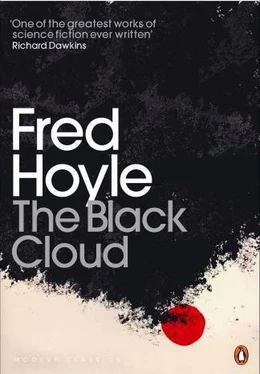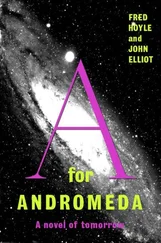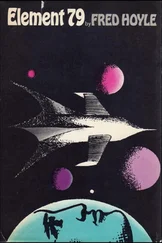Fred Hoyle - The Black Cloud
Здесь есть возможность читать онлайн «Fred Hoyle - The Black Cloud» весь текст электронной книги совершенно бесплатно (целиком полную версию без сокращений). В некоторых случаях можно слушать аудио, скачать через торрент в формате fb2 и присутствует краткое содержание. Жанр: Фантастика и фэнтези, на английском языке. Описание произведения, (предисловие) а так же отзывы посетителей доступны на портале библиотеки ЛибКат.
- Название:The Black Cloud
- Автор:
- Жанр:
- Год:неизвестен
- ISBN:нет данных
- Рейтинг книги:5 / 5. Голосов: 1
-
Избранное:Добавить в избранное
- Отзывы:
-
Ваша оценка:
- 100
- 1
- 2
- 3
- 4
- 5
The Black Cloud: краткое содержание, описание и аннотация
Предлагаем к чтению аннотацию, описание, краткое содержание или предисловие (зависит от того, что написал сам автор книги «The Black Cloud»). Если вы не нашли необходимую информацию о книге — напишите в комментариях, мы постараемся отыскать её.
The Black Cloud — читать онлайн бесплатно полную книгу (весь текст) целиком
Ниже представлен текст книги, разбитый по страницам. Система сохранения места последней прочитанной страницы, позволяет с удобством читать онлайн бесплатно книгу «The Black Cloud», без необходимости каждый раз заново искать на чём Вы остановились. Поставьте закладку, и сможете в любой момент перейти на страницу, на которой закончили чтение.
Интервал:
Закладка:
A discovery of some astronomical interest was made at Nortonstowe about a week before the great cloudbank spread itself over the Earth. The existence of vast drifts of dust on the Moon was confirmed in a dramatic fashion.
The rising temperature in July changed Britain’s usual cool summer to a tropical heat but no worse. The grass was soon burned and the flowers died. By the standards that prevailed over most of the Earth, Britain might be considered to have been little affected, even though the daytime temperature rose to 100° and fell during the night only to about 90°. Seaside resorts were crowded and caravans were to be found everywhere along the coast.
Nortonstowe was now fortunate in possessing a large air-conditioned shelter in which more and more of the party were finding it preferable to sleep at night. Otherwise life proceeded normally, except that walks in the grounds were taken at night instead of in the heat of the Sun.
One moonlit night Marlowe, Emerson, and Knut Jensen were strolling abroad when gradually the light seemed to change. Looking up, Emerson said:
“You know, Geoff, that’s darned queer. I don’t see any cloud.”
“Probably very high-level ice particles.”
“Not in this heat!”
“No, I suppose it can’t be.”
“And there’s a queer yellow look that wouldn’t be ice crystals,” added Jensen.
“Well, there’s only one thing to do. When in doubt take a look. Let’s go along to the telescope.”
They made their way to the dome that housed the Schmidt. Marlowe directed the six-inch finder telescope on the Moon.
“My God,” he exclaimed, “it’s boiling!”
Emerson and Jensen took a look. Then Marlowe said:
“Better go up to the house and call ’em all down. This is the sight of a lifetime. I’m going to take photographs on the Schmidt itself.”
Ann Halsey accompanied the group that hurried to the telescope in response to the urgent call from Emerson and Jensen. When it came to her turn to look through the finder Ann did not know at all what to expect. True she had a general idea of the grey, scarred, sterile surface of the Moon, but she had no knowledge of its detailed topography. Nor did she understand the meaning of the excited remarks that were passing between the astronomers. It was rather in the sense of a duty to be done that she went to the telescope. As she adjusted the focusing knob, a wholly fantastic world jumped into view. The Moon was a lemon- yellow colour. The usual sharp details were dulled by a giant cloud that appeared to extend over and beyond the circular outline. The cloud was fed by jets that sprang out of the darker areas. Every now and then new jets would emerge from these areas, which all the time were rippling and shimmering in an astonishing fashion.
“Come on, Ann, don’t hog it. We’d like a look before the night’s over,” said someone. Reluctantly she yielded her place.
“What does it mean, Chris?’ Ann asked Kingsley as they walked towards the shelter.
“Do you remember what we were saying the other day about the Cloud slowing down? That it’s slowing down as it gets nearer the Sun instead of speeding up?”
“I remember that everybody was worried about it.”
“Well, the Cloud is slowing down by firing out blobs of gas at very high speed. We don’t know why it’s doing this or how, but the work that Marlborough and Leicester are doing shows pretty certainly that it is so.”
“You’re not going to tell me that one of these blobs has hit the Moon?”
“That’s exactly what I think it is. Those dark areas are gigantic drifts of dust, drifts perhaps two or three miles deep. What is happening is that the impact of the high-speed gas is causing the dust to be squirted hundreds of miles upwards from the surface of the Moon.”
“Is there any chance that one of these blobs might hit us?”
“I wouldn’t have thought the chance was very great. The Earth must be a very small target. But then the Moon is an even smaller target and one of ’em has just hit the Moon!”
“What would happen if …?”
“If one hit us? I hardly like to think. We’re worried enough about what’s likely to happen if the Cloud hits us at a speed of perhaps fifty kilometres a second. It would be appalling if we were hit at the speed of one of those blobs, which must be the best part of a thousand kilometres a second. I suppose the whole of the Earth’s atmosphere would simply be sprayed outwards into space, just like the Moon’s dust.”
“What I can’t understand about you, Chris, is how you can know all these things and yet get so worked up about politics and politicians. It seems so unimportant and trivial.”
“Ann, my dear, if I spent my time thinking about the situation as it really is, I should be off my head in a couple of days. Some men would go off their heads. Others’d take to drink. My form of escapism is to roar at politicians. Old Parkinson knows perfectly well that it’s only a sort of game we’re playing. But quite seriously, from now on survival is to be measured in hours.”
She moved in closer to him.
“Or perhaps I should put it more poetically,” he murmured.
“Come kiss me, sweet and twenty
Life’s a stuff will not endure.”
Arrival
From the end of July a night watch was kept at the Nortonstowe shelter. Joe Stoddard was on the rota, as was natural since his work as a gardener had ceased by that time. Gardening was not an activity suited to the tropical heat.
It came about that Joe’s watch fell on the night of 27 August. No dramatic action took place. Yet at 7.30 the following morning Joe knocked hesitantly on Kingsley’s bedroom door. The previous evening Kingsley together with quite a number of other worthies had caroused somewhat heartily. So at first he was scarcely aware that Joe was trying to give him some message. Gradually he realized that the cheerful gardener was unusually solemn.
“It’s not there, sir, it’s not there.”
“What’s not there? For heaven’s sake go and fetch me a cup of tea. I’ve got a mouth like the bottom of a parrot’s cage.”
“Cup of tea, sir!’ Joe hesitated but stood his ground stolidly. “Yes, sir. It’s just that you said I was to report anything unusual, and it really isn’t there.”
“Look here, Joe, much as I have regard for you, I say most solemnly that I’ll disembowel you, here and now, unless you tell me what it is that isn’t there.” Kingsley spoke slowly and loudly. “ What isn’t there? ”
“The day, sir! There’s no Sun!”
Kingsley grabbed his watch. It was about 7.42 a.m., long after dawn in August. He rushed out of the shelter into the open. It was pitch black, unrelieved even by starlight, which was unable to penetrate the thick cloud cover. An unreasoning primitive fear seemed to be abroad. The light of the world had gone.
In England and the western lands generally the shock was cushioned by night, for to them it was during the night hours that the light of the Sun became extinguished. One evening the light faded slowly away as is normally the case. But eight hours later there was no dawn. The advancing wall of the Cloud had reached the Sun during the intervening hours.
The people of the eastern hemisphere experienced in full measure the horror of the fading light. To them the total unrelieved blackness fell in what should have been full day. In Australia for instance, the sky began darkening about noon, and by three o’clock not a glimmer was to be seen, except where artificial illuminations had been switched on. There was fierce wild rioting in many of the world’s major cities.
For three days the Earth lived as a black world, except for those pockets of humanity that possessed the technological sufficiency to provide their own lighting. Los Angeles and the other American cities lived in the artificial blaze of millions of electric bulbs. But this did not entirely protect the American people from the terror that gripped the rest of mankind. Indeed one might say that Americans had more leisure and opportunity to appreciate the situation as they sat huddled over television sets, waiting for the latest pronouncements of authorities who were powerless to understand or control the march of events.
Читать дальшеИнтервал:
Закладка:
Похожие книги на «The Black Cloud»
Представляем Вашему вниманию похожие книги на «The Black Cloud» списком для выбора. Мы отобрали схожую по названию и смыслу литературу в надежде предоставить читателям больше вариантов отыскать новые, интересные, ещё непрочитанные произведения.
Обсуждение, отзывы о книге «The Black Cloud» и просто собственные мнения читателей. Оставьте ваши комментарии, напишите, что Вы думаете о произведении, его смысле или главных героях. Укажите что конкретно понравилось, а что нет, и почему Вы так считаете.












